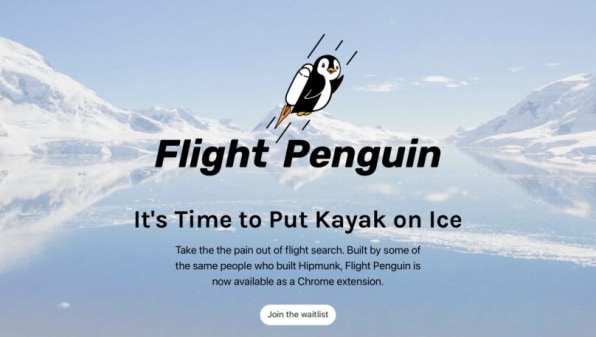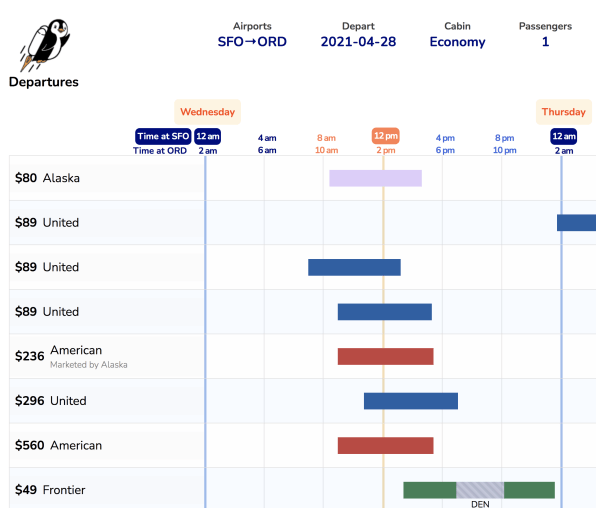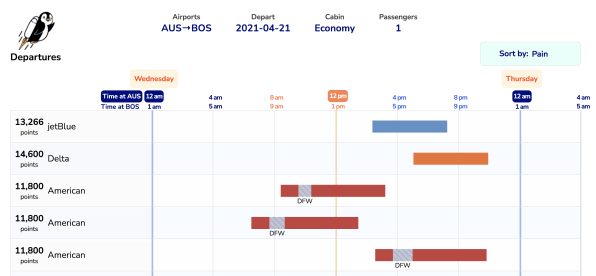Miss Hipmunk? Meet Flight Penguin, its founders’ new travel search engine
In January 2020, travel search engine Hipmunk shut down. The closure came less than four years after it had been acquired by business travel giant Concur, itself part of the even more gigantic SAP. It was one of countless examples over the years of a large company buying something small but innovative and then losing interest. But Hipmunk was so pleasant and useful that some of us are still in mourning: Last week, when a friend asked me for advice on travel booking sites, the first words out of my mouth were “I used to love Hipmunk, which is no more.”
The bad news is that Hipmunk remains dead. However, some of its creators are back with a new travel tool called Flight Penguin that—though not at all a straightforward revival of the Hipmunk concept—will certainly appeal to some of the folks who were once fond of the ‘munk. Like Hipmunk, it’s got a quirky name, an adorable mascot (drawn, in Hipmunk’s case, by Alexis Ohanian), a clean interface, and a focus on finding flights that offer an attractive price without needless layovers and other complications.

What’s different this time around? Well, Flight Penguin, surprisingly, isn’t a website or an app—it’s a Chrome extension. And instead of seeking partnerships with airlines and earning a commission when users book a trip, Flight Penguin is opting out of forging such relationships. Instead, it’s a for-pay service that will cost users $10 a month, after a 30-day free trial. It’s currently still in testing and hasn’t fully opened up to the public, but is letting interested parties add themselves to a waitlist.
Flight Penguin targets people who (at least in non-pandemic times) fly between 5 and 10 times a year.
By charging users, the company hopes to avoid the situation—common to all sorts of commerce sites—in which results are influenced by behind-the-scenes business transactions rather than purely by what’s in the interest of the consumer. “If you go on to other travel sites, comparison search sites, you’re not seeing all the fares they know about,” says Hipmunk cofounder Adam Goldstein, who left Concur in December 2018 and—melancholy over his creation’s demise—began building Flight Penguin after the pandemic started.
Big travel search engines, Goldstein says, are “actually hiding flights, because they’re doing deals with airlines: ‘If you hide flights from third parties, then we’ll give you special access to our flights or special commissions or special advertising deals or whatever.’ ” He acknowledges that even Hipmunk wasn’t able to avoid getting sucked into this business model: “We ended up in this situation where it was very difficult for us to simultaneously serve our users and serve our bottom line.”
A penguin, not a unicorn
Another big difference between Hipmunk and Flight Penguin is that this time around those involved aren’t trying to build the sort of hot startup that could make anybody rich. Goldstein and fellow Hipmunk cofounder (and current Reddit CEO) Steve Huffman are providing seed capital, and Goldstein has been working on the idea as a side project along with engineer Sheri Zada, who is also a Hipmunk alum. They understand that the universe of people who might be willing to pay for travel search is limited; Goldstein says they’re targeting people who (at least in non-pandemic times) fly between 5 and 10 times a year.

Still, for a humble Chrome extension, Flight Penguin is not short on ambition. Typical extensions modify somebody else’s website—say, by tweaking Gmail’s interface—but Flight Penguin is a full-blown experience unto itself. Its search fields and results page are reminiscent of Hipmunk, and it’s aggregating flight and prices in a fashion similar to what Hipmunk once did and other travel search sites such as Kayak still do. The main evidence that it’s an extension running on your computer rather than a web application is that you might need to wait a bit longer for results.
But performing searches locally rather than in the cloud has its advantages, too. “Because it’s all running on the client side, the data that we’re getting is exactly the same data that you would see on the airlines’ websites,” Goldstein says. “There’s no caching where the flights get out of date because there’s some search that’s being stored for 10 minutes. There’s no API weirdness where—we saw this [at Hipmunk]—the airline would show one price on their website, but a different price through their API, and someone would click and the price would go up $70.”

Back in the day, Hipmunk sorted flights by “agony” by default, with the least agonizing ones (such as lower-priced direct flights) at the top. Flight Penguin uses “pain” to describe the same approach. “That’s our consistent philosophy, trying to make it easy to find the best option, not just the cheapest one,” Goldstein says. The new service can also show options involving multiple-airline itineraries—which can save money—and lets you search by dollars or points.
In a reference to travel search’s biggest name, the Flight Penguin homepage declares that “it’s time to put Kayak on ice.” But for now, Goldstein says, his new service isn’t trying to be a one-stop shop. It searches only for flights—the biggest headache for people researching travel plans, according to Goldstein—and has no immediate plans to tackle hotels or rental cars. How about offering Flight Penguin as something other than a Chrome extension? “There could be other versions, but the Chrome extension really is the technology that enables a lot of this stuff,” he says.
When Hipmunk died, I was ticked off and then just sad, but soon thereafter the world went into lockdown and I spent a year making no travel plans whatsoever. Now that going places is finally starting to feel like a possibility again, it would be nice to think that Flight Penguin has a shot at taking wing.
(42)



